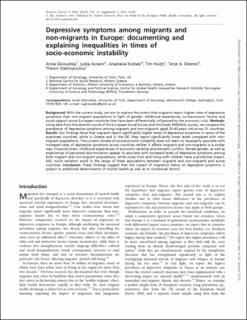| dc.contributor.author | Gkiouleka, Anna | |
| dc.contributor.author | Avrami, Lydia | |
| dc.contributor.author | Kostaki, Anastasia | |
| dc.contributor.author | Huijts, Tim | |
| dc.contributor.author | Eikemo, Terje Andreas | |
| dc.contributor.author | Stathopoulou, Theoni | |
| dc.date.accessioned | 2022-09-06T12:43:18Z | |
| dc.date.available | 2022-09-06T12:43:18Z | |
| dc.date.created | 2018-12-17T15:06:11Z | |
| dc.date.issued | 2018 | |
| dc.identifier.citation | European Journal of Public Health. 2018, 28 54-60. | en_US |
| dc.identifier.issn | 1101-1262 | |
| dc.identifier.uri | https://hdl.handle.net/11250/3016039 | |
| dc.description.abstract | Background
With the current study, we aim to explore the extent that migrants report higher rates of depressive symptoms than non-migrant populations in light of gender, childhood experiences, socioeconomic factors and social support across European countries that have been differentially influenced by the economic crisis.
Methods
Using data from the seventh round of the European Social Survey and the Greek MIGHEAL survey, we compare the prevalence of depressive symptoms among migrants and non-migrants aged 25–65 years old across 21 countries.
Results
Our findings show that migrants report significantly higher levels of depressive symptoms in seven of the examined countries, while in Greece and in the UK, they report significantly lower levels compared with non-migrant populations. The current climate of socioeconomic instability does not seem to necessarily associate with increased rates of depressive symptoms across countries neither it affects migrants and non-migrants in a similar way. Financial strain, childhood experiences of economic hardship and domestic conflict, female gender, as well as experiences of perceived discrimination appear to associate with increased levels of depressive symptoms among both migrant and non-migrant populations, while social trust and living with children have a protective impact. Still, much variation exists in the range of these associations between migrants and non-migrants and across countries.
Conclusion
These findings suggest that the impact of migration status on depressive symptoms is subject to additional determinants of mental health as well as to contextual factors. | en_US |
| dc.language.iso | eng | en_US |
| dc.publisher | Oxford University Press | en_US |
| dc.title | Depressive symptoms among migrants and non-migrants in Europe: documenting and explaining inequalities in times of socio-economic instability | en_US |
| dc.type | Journal article | en_US |
| dc.type | Peer reviewed | en_US |
| dc.description.version | publishedVersion | en_US |
| dc.rights.holder | This article is published and distributed under the terms of the Oxford University Press, Standard Journals Publication Model (https://academic.oup.com/journals/pages/open_access/funder_policies/chorus/standard_publication_model) | en_US |
| dc.source.pagenumber | 54-60 | en_US |
| dc.source.volume | 28 | en_US |
| dc.source.journal | European Journal of Public Health | en_US |
| dc.identifier.doi | 10.1093/eurpub/cky202 | |
| dc.identifier.cristin | 1644370 | |
| cristin.unitcode | 194,67,25,0 | |
| cristin.unitname | Institutt for sosiologi og statsvitenskap | |
| cristin.ispublished | true | |
| cristin.fulltext | original | |
| cristin.qualitycode | 1 | |
